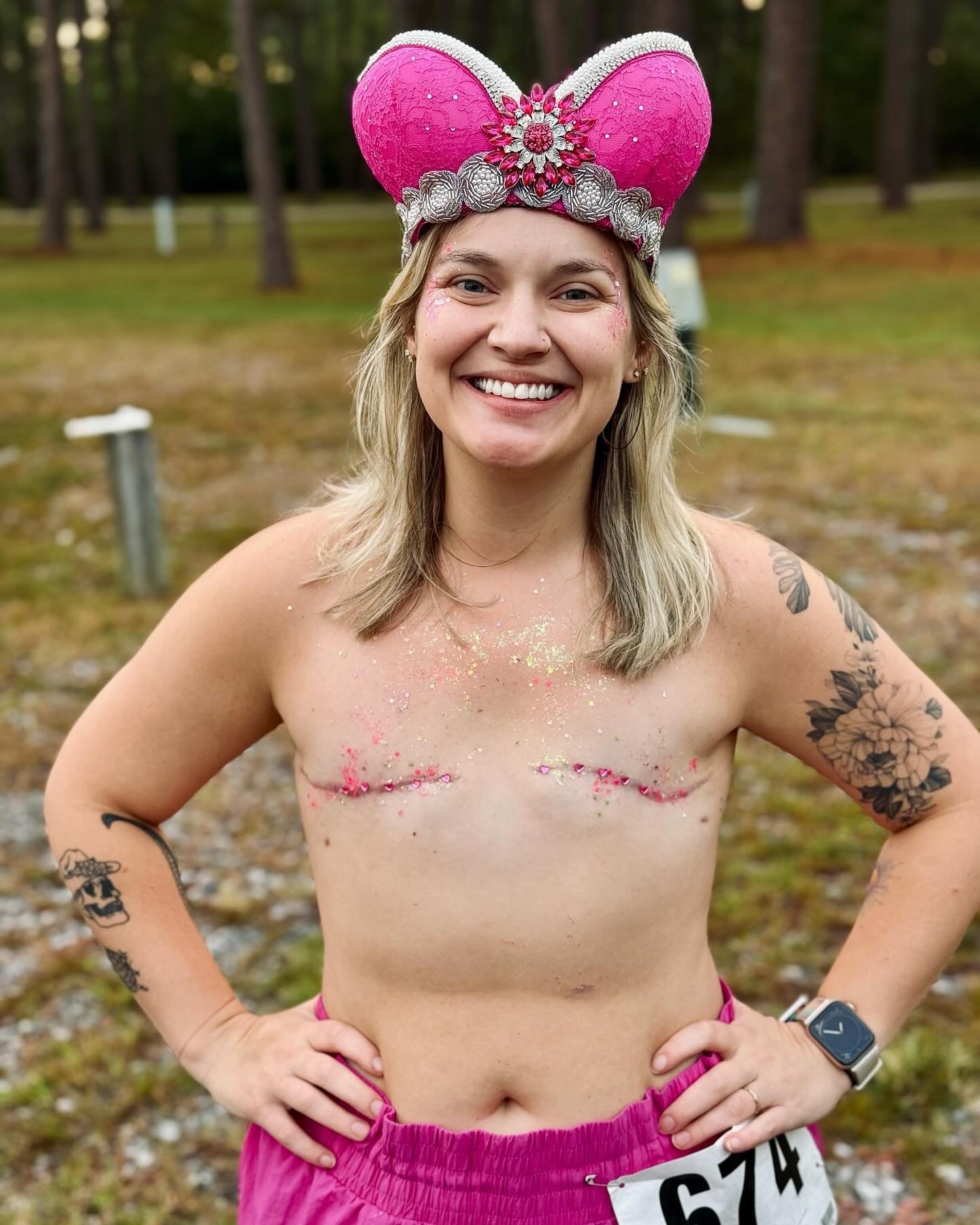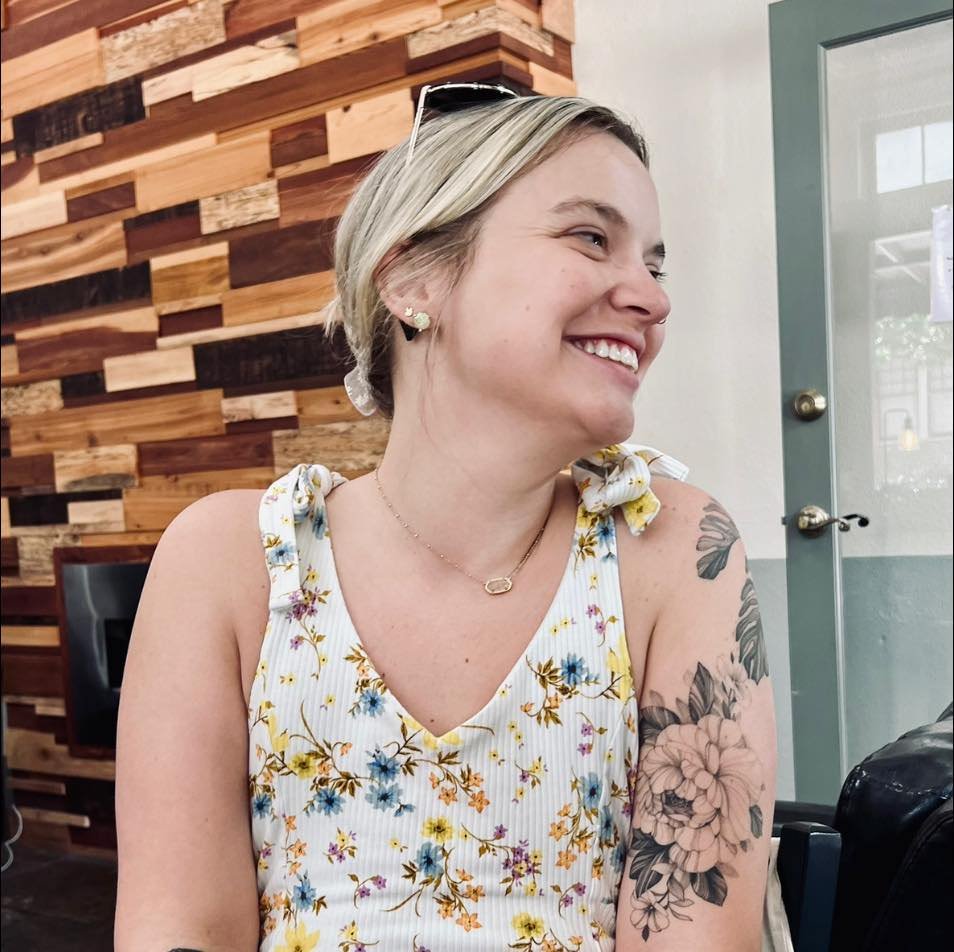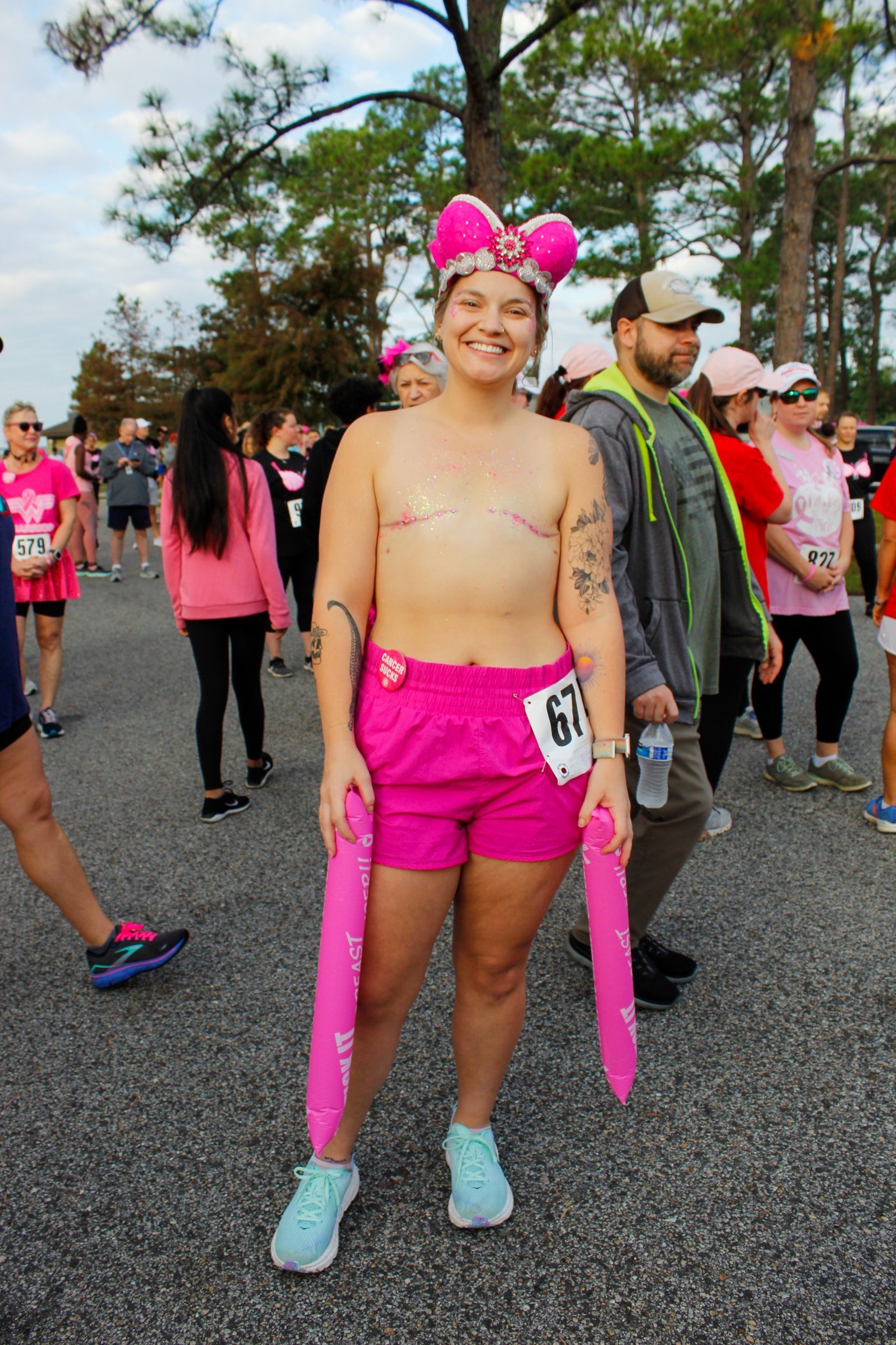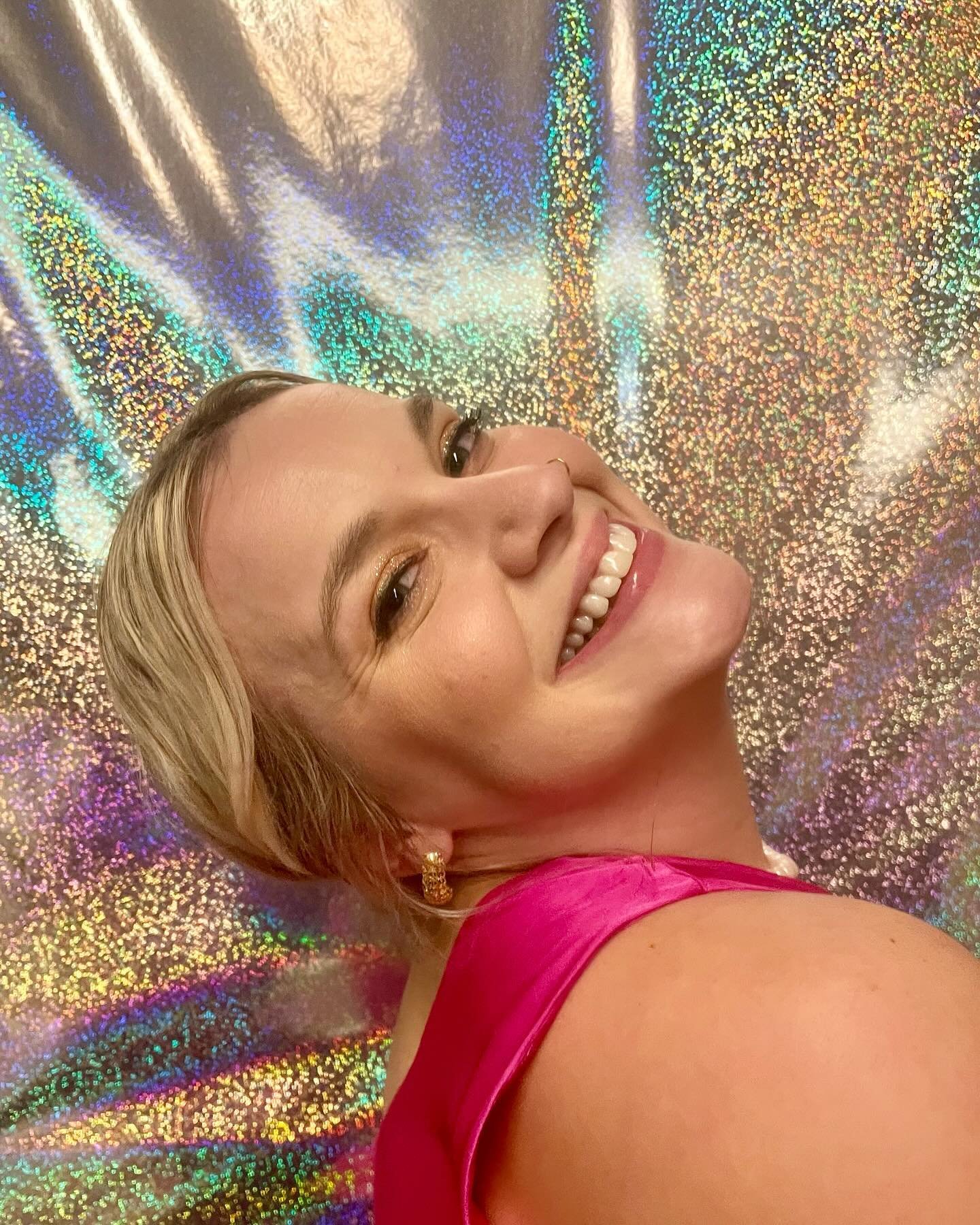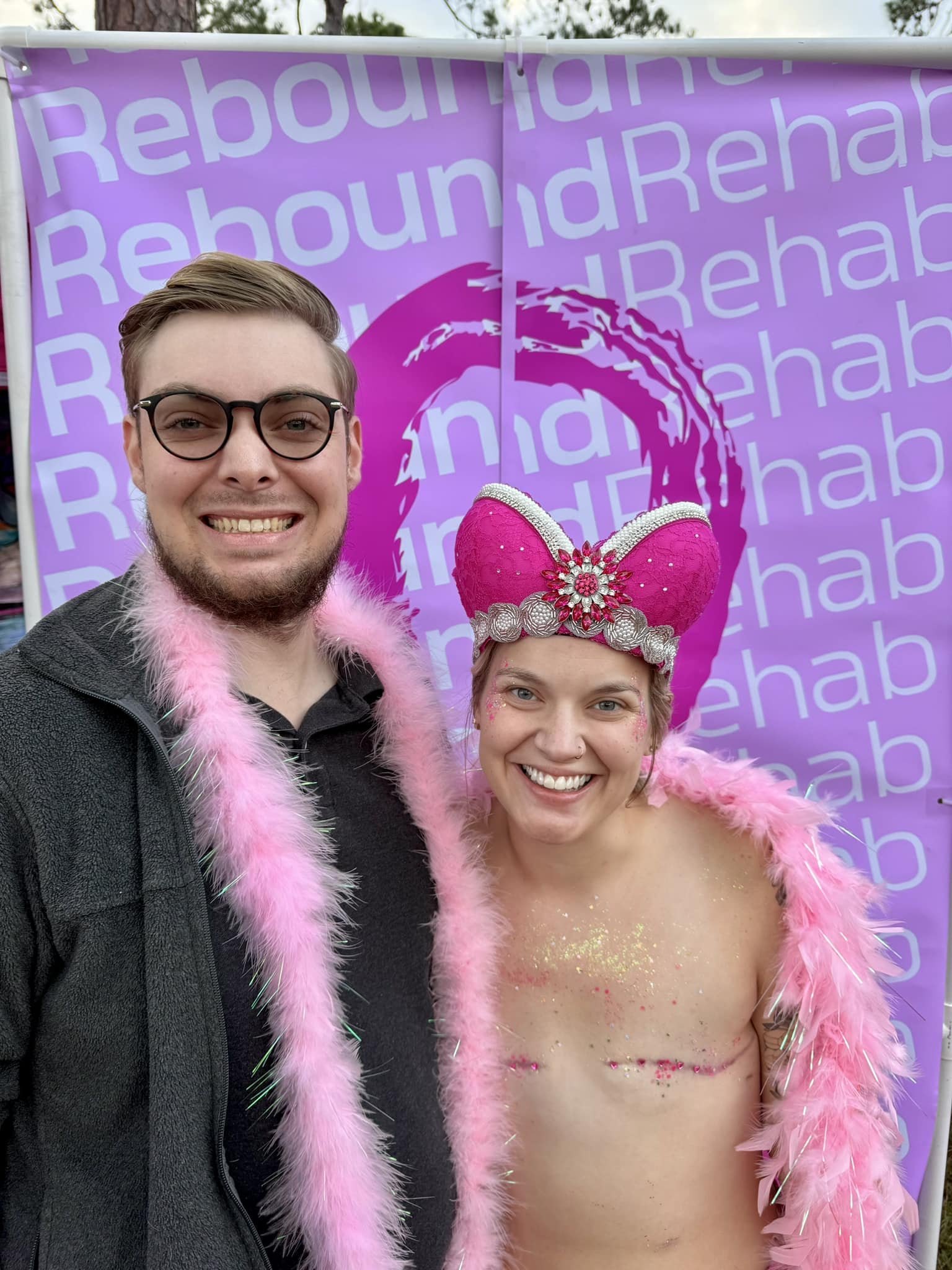Warrior of the Month: February 2024 Haley Orillion
“Sometimes, I look in the mirror, and I think that I look very mutilated, and then sometimes I look in the mirror, and I think, like, damn I look cool as f***. It’s just a very drastic change, and I’m still very much in the process of trying to process all of that and all the changes,” 29-year-old Haley Orillion said.
Haley, a resident of Mobile, is a previvor who underwent preventive surgeries to mitigate the risk of breast and ovarian cancer.
At such a young age, Haley has had to make what many would call impossible decisions… all because of BRCA1.
According to the Center for Disease Control and Prevention, the BRCA1 gene only has to be present in one parent. If one parent has this gene, there is a 50% chance of their children inheriting BRCA1. This gene is most commonly affected in hereditary breast and ovarian cancers due to inherited mutations, thus resulting in an increased likelihood of developing breast and ovarian cancers.
Haley's journey to genetic testing began around fourteen years ago when her paternal aunt was diagnosed with triple negative breast cancer. Following her cancer diagnosis, Haley’s aunt underwent genetic testing and tested positive for the BRCA1 gene. Given that this gene comes from her father's side, Haley's family urged her to get tested as well. Unfortunately, Haley's father had passed away before her aunt's diagnosis, so there was no way to know for sure if she carried the gene mutation.
“It was just very overwhelming– stuff happening all at once,” Haley said. “I was like, ‘I cannot get tested for this because I don’t even know what that means.’”
Despite the persistent encouragement from her family, Haley remained hesitant to undergo genetic testing for several years.
Her primary concern was that if the results came back positive, she would be disqualified from obtaining health and life insurance. As she was a college student at the time and financially independent, this was a significant consideration for her.
A few years later, she had reconsidered getting tested again after she married her husband, Travis.
“My uncle, who’s my dad’s brother, ended up getting colon cancer, and he tested positive for BRCA1. Then, his daughter tested positive for BRCA1, and she was two or three years younger than me,” Haley said. “So, we knew that at least two of them [her dad’s three siblings] had the BRCA gene.”
Haley's family persisted in their attempts to convince her into undergoing genetic testing, but she remained adamant in her stance of not being ready to confront the unknown.
“I was like, ‘Absolutely not. I don’t wanna know. Because if I know, I’m going to have to do something about it,’” Haley said. “I, at 23 years old, am not willing to do anything about this, nor do I want to know my cancer risk. I did a lot of ignoring and a lot of not facing the potential. Nobody else in my family could get tested because my dad’s dead, so there was no way to know if my lineage had it or not.”
Haley then made the transition from being a social worker in the emergency room at USA Hospital to the Mitchell Cancer Institute. Initially, she hoped to avoid confronting the unknown. However, her work at the cancer center exposed her to a diverse range of cancers and genetic testing, prompting her to eventually confront the uncertainty that had been looming over her.
“I learned a lot about the genetic testing that happens because we do it there in house, so I got to have a lot of conversations with doctors and genetic counselors,” Haley said. “They were able to educate me on what it would mean if I did have BRCA and what would happen.”
After years of ignoring the unknown, Haley finally made the decision she could no longer put aside.
In September 2022, Haley underwent genetic testing, and her results for BRCA1 came back positive. Haley then met with both her gynecological oncologist and breast surgeon to discuss further steps.
“I think my exact breast cancer percentage was a 70% chance of lifetime development of breast cancer,” Haley said. “I was like, ‘Well, that pretty much answers any questions that I have about what I’m supposed to do.’”
After consulting with her doctors, Haley was given a variety of screening options, allowing her the opportunity to weigh her choices and consider when she would like to undergo preventative surgeries.
“You do like an MRI or mammogram every six months, and then if they find something, you have to undergo a biopsy. Breast biopsies are torturous, and it’s just a very invasive procedure. Once I found out my risk and what my time options were, I was like, ‘No, that’s exhausting. I’m not going to the doctor every six months,’” Haley said. “Especially because there is no real screening for ovarian cancer, but you could do a vaginal ultrasound every three months. I was like, ‘So every month, I’m going to be at the doctor forever… that’s a lot.’”
In addition to an exceedingly high risk of developing breast cancer, Haley's lifetime risk of ovarian cancer was estimated at approximately 60%. Prior to receiving her test results, Haley had already made the decision to undergo the preventative surgeries, with the only remaining considerations being the timing, type, and approach for the procedures.
Haley, recognizing the risk of cancer and her positive BRCA1 status, made a decision not to pass on these risks to potential children. Hence, this was an additional factor contributing to her choice to undergo the surgeries.
“It’s a relief to have the burden of potentially passing this gene on eliminated,” Haley said.
Upon consulting with her healthcare providers, who coincidentally were also her colleagues, Haley ultimately decided to undergo a risk-reducing double mastectomy.
“At the end of the day, and this is how I kind of, like, came down to the last decision after I talked to five hundred million people and every single doctor and nurse at the cancer center,” Haley said.
“Somebody asked me… they said ‘In five years, if you end up getting breast cancer, are you gonna regret not making the choice now?’ I'd be pissed. Because, like, you're right. I should do it. That was kind of like, ‘Do I live every day thinking that I have cancer, or do I go ahead and take care of it and prevent it?’”
Haley underwent a partial hysterectomy in December 2022, during which her ovaries were left intact. Additionally, she underwent a risk-reducing double mastectomy approximately nine months ago, in May 2023.
In addition to undergoing a double mastectomy and partial hysterectomy, Haley had to undergo an additional abdominal surgery in October 2023 because of excessive scar tissue. Within a week of this procedure, she had to have her thyroid removed due to the suspicion of thyroid cancer.
In the last fifteen or so years, Haley has gone through many challenges. However, this last year has been nothing but uphill battles since her BRCA1 diagnosis.
“It’s still in transition. I actually went to the store today because I need to buy a dress for a gala that I'm going to next month, and I cried because I don't have breasts. These dresses don't look normal or like they should, and there's alterations that I have to get done. They have built-in boobies, and I don’t have boobies. That upset me,” Haley said.
According to Haley, her breast surgery was successful; however, the recovery process proved to be extremely challenging.
“The drains are really hard. We all say that, but, like, I was ready to rip it out of my skin myself. The scars are bulgy and weird and crooked, so I am very much still getting used to my body again and learning her again,” Haley said.
While Haley has undergone so much already, she feels as if this journey is not over.
“It's kind of been, like, microdosed throughout the last year. It was just kind of like, ‘Okay… Get in, do surgery, get out, get to the next year, get to the next surgery, then get done.’ There have been so many complications from these surgeries, but I still don't feel like I'm done with it yet,” Haley said.
Through it all, Haley has experienced more than a person should in a lifetime just over the last 15 years, let alone the last year. At such a young age, she made decisions that no one should have to face in their twenties.
“I cringe when people say I'm brave, and they never could have done this. It's weird because it almost feels like I did it, but it was like an autopilot did. I mean, there were a lot of thoughtful choices that were made, but it was kind of like I've just gone into autopilot and just did it. And now I'm starting to feel the things, and it's tough. Like, this is good, and this sucks,” Haley said.
In addition to coping with physical and emotional obstacles, Haley is attempting to ascertain her sense of belonging.
“It's just this very unknown path to have a cancer marker, have preventative surgeries, but not be put into the cancer world per se. It’s like being in this middle ground, not like being a normal human with a regular cancer risk and being a person with cancer, so that's been one of my biggest challenges over the last year. It's just, like, figuring out where I fit,” Haley said.
Currently, Haley is serving at a private practice in Mobile. Though she acknowledges that her journey is ongoing, she's grateful to be leading a healthy and gratifying life with her husband, three dogs, and two cats, all while being cancer-free.

